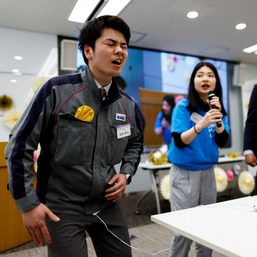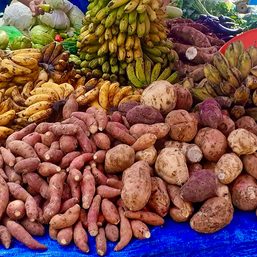SUMMARY
This is AI generated summarization, which may have errors. For context, always refer to the full article.

Editor’s Note: An earlier version of this story, based on a press release, said the scientists discovered the gene. The researchers said they did not discover the gene but its link to breast cancer progression. This has been corrected.
MANILA, Philippines – A molecular biologist and her student from the University of the Philippines (UP) have discovered the link between a certain gene and breast cancer progression, which includes factors like stress and an irregular body clock.
Molecular biologist Dr. Pia Bagamasbad and her student, Weand Ybañez, of the UP Diliman National Institute of Molecular Biology and Biotechnology, recently published an article in the journal Cancer Cell International about the function of a tumor-suppressor gene called Krüppel-like factor 9 (KLF9) in the growth and progression of breast cancer in women’s body.
In an interview with Rappler, Bagamasbad clarified that they did not discover KLF9 but rather its link and importance to breast cancer progression in relation to factors such as stress and irregular “light-dark cycle.”
A disrupted light-dark cycle occurs, for instance, among night shift workers and frequent international travelers.
In their study, the researchers found that KLF9 is downregulated in breast tumors compared to normal breast tissue.
The gene follows a 48-hour window of oscillation pattern in normal breast tissue. With stress hormones and the irregular light-dark cycle affecting the activity of the gene, it prevents the natural function of the gene to suppress tumor growth.
The disruption of the circadian cycle is an emerging driver of breast cancer, with epidemiological studies linking shift work and chronic jet lag to risk of the disease, according to the researchers.
In normal body function, the circadian cycle, which involves a regular 24-hour pattern of biological activity, is mainly controlled by the 12-hour light-dark cycle. This regulates several bodily functions, like the sleep-wake cycle, digestion, and the release and suppression of various hormones at certain times of the day.
“We call cancer a mistake of the genome. [It means that] multiple mistakes have to be made by a cell for cancer to develop. Stress alone is not a cause of cancer,” Bagamasbad pointed out, highlighting the significance of their study as a molecular basis in breast cancer development.

Breast cancer prevention in a work-driven society
Night shift workers and frequent international travelers must be more attentive to their circadian rhythm since light controls the regularity of people’s bodily functions, including the appropriate timing of when cells divide and multiply, as well as the repair of cell damage to prevent cancer and other diseases. Bagamasbad explained the importance of the body’s natural interaction with day and night (the presence and absence of light or circadian rhythm) and the results of disruption contributing to cancer.
“Kailangan i-darken mo ‘yung paligid mo sa umaga when you’re sleeping. Shift your light and dark cycles din – artificial light sa gabi, artificial night din sa umaga,” she said.
(You need to darken your surroundings during the morning when you are sleeping. You also need to shift your light and dark cycles – if you have artificial light during the night, you also need artificial night during the day.)
Aside from the significance of hormonal balance in the body, maintaining the circadian cycle is necessary as the World Health Organization also acknowledged that its disruption is a risk factor for cancer.
While the gene is present in both men and women, they found that KLF9 antagonizes estrogen action. It means that while breast incidents in men are only less than 1%, trans women may increase their risk for breast cancer, although lower than cisgender women, due to the increase of estrogen in their bodies.
Since the samples collected for the study were only from cisgender women, Bagamasbad recognized the need for further study.
Recommendations
The results of the study could inform policy recommendations for the government’s and companies’ labor policies.
In the workplace, shifting schedules for a short period is not advisable for the body, according to Bagamasbad. While it is understandable that many employees work during the night, companies need to help their people establish regularity in their wake-sleep cycle for as long as possible instead of shifting schedules biweekly or monthly.
“Health should be a priority and should never be compromised, but nowadays, it’s really hard to balance healthy living habits and daily living norms,” said Lois Gaspar, who works the graveyard shift in the banking industry and lives with Polycystic Ovary Syndrome (PCOS).
With 4.5 million Filipino women living with PCOS, a hormonal imbalance problem for women, reducing stress and balancing their circadian rhythm are vital for their health.
At the national level, the government has a critical role in securing people’s health and rights. Currently, the Labor Code of the Philippines includes only at least 10% night differential pay for people working in the private sector between 10 pm and 6 am.
In April 2022, former president Rodrigo Duterte signed Republic Act 11701, which grants government employees a night differential pay not exceeding 20% of the hourly basic rate for any work performed between 6 pm and 6 am.
This night differential, however, is different from hazard pay, which is “an additional compensation for performing hazardous duties and for enduring physical hardships in the course of performance of duties,” as described by the Department of Budget and Management.
Hazard pay, while not mandatory in the country, is often limited to health workers and government uniformed personnel, and was only highlighted during the COVID-19 pandemic.
“They also deserve hazard pay because it’s a health risk, just like how we compensate our doctors, our firemen, and our policemen. They, too, are exposing themselves to unnecessary risk,” Bagamasbad said about night shift workers.
Bagamasbad and her team continue to work on understanding things at the molecular level, particularly other genes known as tumor suppressors.
“When the stressors in life are getting too much, we have to be proactive in making sure that we intervene,” she added. – Rappler.com
Add a comment
How does this make you feel?







![[Dash of SAS] Making abortion a constitutional right](https://www.rappler.com/tachyon/2024/03/Its_true_-_Flickr_-_Josh_Parrish-1.jpg?resize=257%2C257&crop=125px%2C0px%2C768px%2C768px)


There are no comments yet. Add your comment to start the conversation.